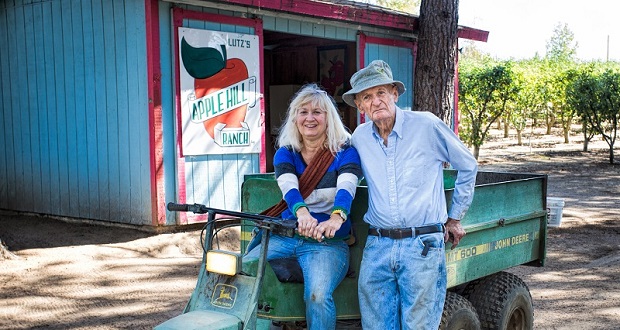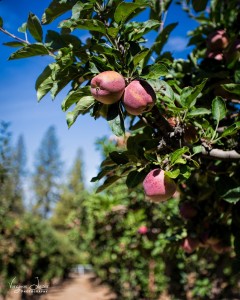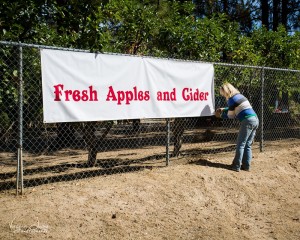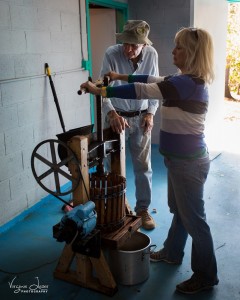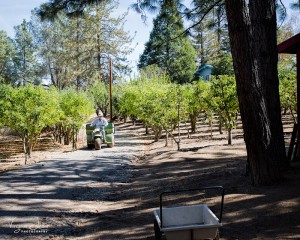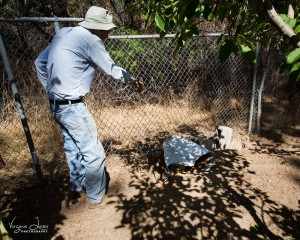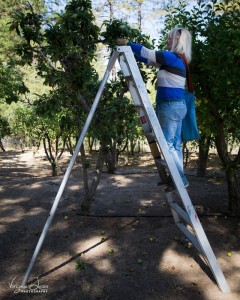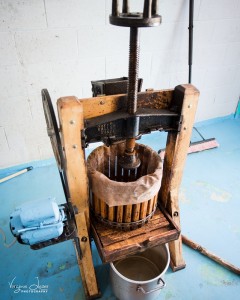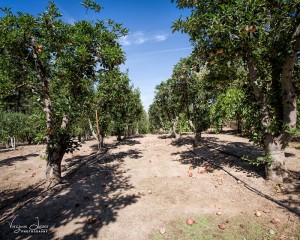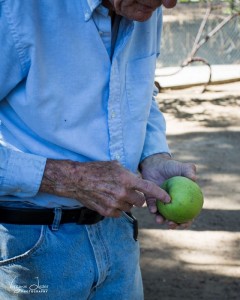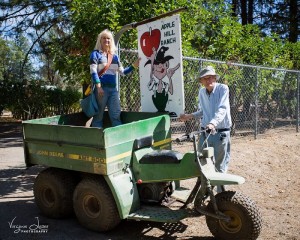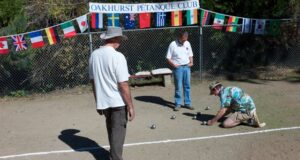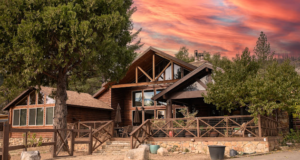OAKHURST – In keeping with a local tradition that dates back about 30 years, Lutz Apple Farm will open again this season thanks to the efforts of Cheryl Lutz and John Lutz (rhymes with boots) over the last twelve months.
Apples are being picked and sorted right now, the freezer is filling with cider, the children’s play area is ready and the scarecrow is stuffed. Nearby, deer loiter in anticipation of getting fat on their share of apples, while the bears continue to be held at bay.
Cheryl is the daughter of longtime apple farm owner Paul Lutz, who sadly passed away a year ago, just two days before his farm would open to the public, selling apples and cider to all, as had been the practice for decades. Cheryl, her family, and some community supporters rallied together last year after the sudden loss of Paul, and somehow business went on, almost as usual. In fact, the place he loved sold out its bounty of fresh apples and crisp cider in about two weeks in 2014.
Now, they’re back and ready to do it again.
John Lutz, 88, is Paul’s fraternal twin brother. He’s a tall, retired dentist who takes a methodical approach to farming that now has new irrigation lines replacing old, worn out ones, where previously Paul was satisfied with yards electric tape patching leaks. Paul’s daughter Cheryl Lutz, small and blonde, has the energy of three or four women. Over the last year, between the two relatives – John and Cheryl have managed to keep their apple farm on track for seasonal bounty.
It hasn’t been easy, but it sure is a labor of love. With nearly 750 trees on two-and-a-half acres perched nicely off Crane Valley/Road 426, the demands of managing Lutz Apple Ranch are many.
Cheryl lives in Sacramento, and has regularly migrated to Oakhurst during apple season to help out her dad. Everything Cheryl knows about the farm she learned from her dad, and it’s rare and plentiful local knowledge. In the last year, she and John have taken care of the ranch “the best they could,” explaining that one of their big concerns has been water: how much to use, and how often. They’ve figured things out along the way.
Paul Lutz bought the apple ranch back in 1986, says Cheryl, from his oldest brother. Paul, John and the other nine kids in the Lutz family were raised on a farm in Selma, where they grew cotton, alfalfa, and ten acres of boysenberries. Farming is in the family blood for at least three generations, and fortunately for daughter Cheryl, Paul kept good records. He even had a spread sheet of the days he was open over the years, so she can average it out in order to take a leave of absence from her post-retirement retail merchandising position in Sacramento. Right now, only one thing is important.
“The apples look good,” Cheryl confirms.
It’s taken Cheryl and John together to do what Paul did on his own. From weed-eating all the ground under the trees, a job Cheryl is best with safety goggles on and her mouth shut, through thinning the apples, to picking, sorting, mashing and selling, they have managed to ready the property for the onslaught of apple-lovers who will come out for their bushels this year.
They’ve only had a little trouble with bears, Cheryl mentions, saying what she thinks is a mother and two cubs have stealthily entered toward the back of the property, cyclone fence not entirely an obstacle. It’s interesting to note that dozens of apples already on the ground are not good enough for these picky bears – instead, they want the apples still hanging from the tree.
So they lumber up the branches and pretty quickly come crashing down, taking limbs with them. These are dwarf apple trees. John has used some practical ingenuity to keep the bears out, lashing a wheel barrow to one entry point and essentially plugging another with a trash can, and things seem to have settled down, bear-wise.
When the trees first blossomed this spring, Cheryl and John were out spraying for codling moth, also known as apple work. As Paul did, they only spray the blossom, never the bud. Once the trees start to bud out, it’s time for thinning, a laborious process where every other apple in a cluster of five to seven is removed.
“You have to thin them so the tree can grow what you left behind.” The process of thinning takes place twice to ensure the job is done right.
Finally, after lots of weeding, watering, and worrying, there’s the picking. Cheryl calls it a blind pick: they go down the lines of trees and carefully grab every apple, placing them carefully into their specially designed bags, to avoid bruising. The plan is pick now, sort later. Last year, local church friends from Seventh Day Adventist came to the rescue.
Tess and Matt Morgan were instrumental in making it through last season, says Cheryl. The couple was there at the apple farm every day (except Saturdays when Lutz is closed for observance of Sabbath) and the family is so appreciative of the help. Cheryl and John can use some volunteers to get them through the season this year, as well. This business is not non-profit technically, but it may as well be, considering it used to be a one-man show.
Starting last week, just as every year, apples are being sorted into three categories: apples for juicing, apples for selling, and apples to give to the deer. Cheryl wants the community to know they’re seriously looking for volunteers to assist them in picking, sorting, mashing and more through the busy apple season. They get a lot of business on Fridays, she says, and they’re also open on Sundays. It can be noted that volunteers work hard, have fun, learn something new, and get to keep some cider.
Besides picking and sorting in the morning, someone has to wash the apples and help make cider in the afternoon. There’s a juice room up the hill where the cider press is located, a mostly-mechanical machine that looks like it came right off the set of Little House on the Prairie. The contraption is unchanged over hundreds of years, except Paul has modified theirs a little bit, and if you order one today they look just the same. At Lutz they make most of their cider ahead of the time, and need at least two people to do it, using a baseball bat to turn the apple press. The cider is poured into half-gallon containers and the leftover mash – about 25 pounds a day – is thrown over the fence to the deer or used as mulch.
Production of cider runs about 30 half-gallon bottles an hour when a few people are working. Last year, Cheryl says they sold about 600 bottles over the season.
With nearly a dozen different varieties of apple on hand, the Lutz farm uses a combination of three or four different types to get the flavor of the cider just right: usually it’s Jonathans, Red Gold, Blushing Gold and Granny Smiths. “Tastes flat,” Cheryl says her dad Paul would have remarked when the stuff wasn’t up to snuff, blending apples until the flavors popped in your mouth.
People sometimes wonder what the difference between juice and cider is. According to Cheryl, it has to do with water content. In the Lutz cider, no water or sugar or anything is added. They do no pasteurizing, although the juice is frozen before being sold.
In addition to the varieties mentioned above, Lutz grows Summer Time, Red Delicious, Yellow Delicious, Mutsu, Fuji, Gala, Pink Lady, and Black Arkansas. Trending now in apple markets is a variety known as Honey Crisp, and Cheryl will plant some of those, as well. They’re hard to grow, she says, but popular.
The life of the average dwarf apple tree is about 32 years and many of the trees at Lutz Farm are nearing that age or have hit it. About 100 trees have been replaced already in the last several years. It takes new trees between three and five years to bear good fruit.
The apples are hand-sorted after picking, and checked for worms or bruising. Before last year, John wasn’t involved in the apple farm too much, except to stop by once a week or so, trying to get brother Paul off the land and onto Bass Lake for some fishing. When they opened up in 2014, just two days after Paul passed away, Cheryl and John didn’t even know where the water faucets in order to turn them on to irrigate.
The persistent pair has come a long way since then. When asked what Paul would say about the work Cheryl and John have done to get the gates open once again, they agreed that Paul would say, he wished he was helping.
As of this interview with Cheryl and John, they plan to open Lutz Apple Farm on Thursday, Oct. 1 for the 2015 season. They’ll be open from 9 a.m. to 4 p.m.
Just before we left, John slipped me an apple, perfectly formed and warm from the sunshine. I bit into it driving down 426. I swear it was the best apple I’ve ever had.
Lutz Apple Ranch is located at 52137 Road 426. Call 559-683-3217 for more information and to lend a hand.
Read more about Paul Lutz here.

